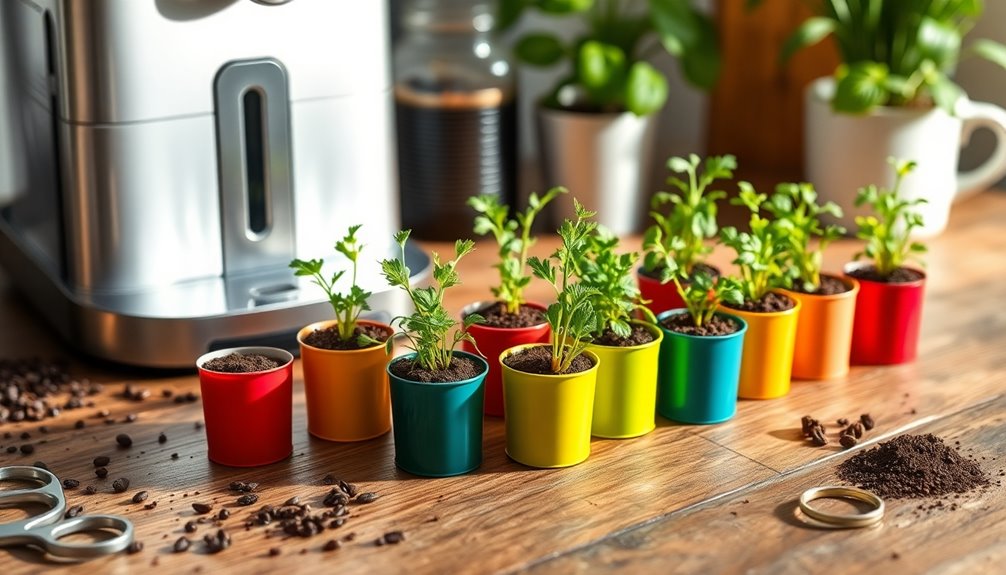To practice effective water stewardship, you should use high-quality filtration systems that reduce water waste and improve water quality for brewing. Regularly maintain these filters to prevent mineral buildup and extend equipment life. Proper wastewater management is essential; treat or recycle greywater for cleaning or landscaping, complying with local regulations. By adopting these practices, you’ll conserve water, protect the environment, and boost your café’s sustainability efforts. Continue exploring how to optimize your water use responsibly.
Key Takeaways
- Implement high-quality water filtration systems to reduce water usage and ensure clean, safe water for brewing.
- Regularly maintain and replace filters to optimize performance and prevent mineral buildup.
- Treat and filter wastewater from coffee processing to minimize environmental impact and enable reuse.
- Recycle greywater for non-potable purposes like cleaning or landscaping to conserve fresh water.
- Monitor and document water consumption to identify reduction opportunities and support sustainable water management.

Café water stewardship is essential for ensuring sustainable coffee production and protecting local water resources. As a coffee producer or shop owner, you play a crucial role in managing water responsibly. Implementing water conservation practices isn’t just good for the environment; it also supports sustainable sourcing by maintaining healthy ecosystems that coffee plants depend on. Every drop counts, so adopting efficient water use strategies can significantly reduce your café’s environmental footprint.
Start by evaluating your current water consumption. Simple measures like fixing leaks, installing low-flow fixtures, and using water-efficient equipment can make a big difference. For instance, using drip coffee makers or pour-over methods often requires less water compared to traditional brewing machines. Educating staff about water conservation helps foster a culture of responsibility, ensuring everyone understands the importance of mindful water use. Collecting data on water use helps identify areas where you can cut back, making your efforts more targeted and effective.
Evaluate water use, fix leaks, train staff, and track consumption to promote responsible water management.
Sustainable sourcing goes hand-in-hand with water stewardship. When you choose coffee beans from producers who prioritize water management, you support practices like shade-grown coffee or farms that use water-efficient irrigation systems. These methods reduce water stress on local water sources and promote biodiversity. By partnering with suppliers committed to sustainable sourcing, you ensure that your coffee’s journey from farm to cup aligns with environmentally responsible practices. This not only preserves water resources but also strengthens your brand’s reputation among eco-conscious consumers.
Filtration is another key aspect of water stewardship. Using high-quality water filters reduces the need for excessive water usage and ensures your coffee is brewed with clean, safe water. Proper filtration also prevents mineral buildup in equipment, extending its lifespan. Regular maintenance of your filtration systems optimizes water use, reducing waste and preventing the need for frequent replacements. This sustainable approach helps you conserve water over the long term and guarantees a consistently high-quality product.
Wastewater management is equally vital. Coffee processing generates wastewater that, if untreated, can pollute local waterways. Implementing filtration and treatment systems minimizes environmental impact. Recycling greywater for non-potable uses like cleaning or landscaping further conserves freshwater resources. Proper disposal of wastewater, aligned with local regulations, ensures that harmful substances don’t contaminate nearby water bodies. Taking these steps demonstrates your commitment to environmental stewardship and helps maintain healthy water cycles in your community.
Frequently Asked Questions
How Does Water Quality Impact Coffee Flavor?
Your water quality directly impacts coffee flavor because mineralization affects flavor extraction. If your water has the right mineral balance, it promotes the coffee’s natural flavors and creates a balanced taste. Too many minerals can overshadow delicate notes, while too few may result in weak extraction. You need to optimize water mineralization to ensure consistent, high-quality flavor, making every cup truly enjoyable.
What Are the Most Sustainable Water Sourcing Methods for Cafés?
Think of sustainable water sourcing as nurturing a delicate garden. You can harvest rainwater, capturing nature’s gift before it slips away, and support aquifer recharge by replenishing underground reserves. These methods flow together like a well-orchestrated symphony, ensuring your café’s water use remains eco-friendly. By embracing rainwater harvesting and aquifer recharge, you’re safeguarding resources, reducing reliance on municipal supplies, and brewing sustainability into every cup you serve.
How Can Cafés Reduce Water Usage During Brewing?
You can reduce water usage during brewing by focusing on water conservation and brewing efficiency. Use precise measurements to avoid overflows, and regularly maintain your equipment to prevent leaks. Opt for energy-efficient brewing machines that use less water, and consider batch brewing to save water per cup. Implementing these practices helps conserve water, lowers costs, and promotes sustainable café operations while maintaining high-quality coffee.
What Innovative Wastewater Treatment Technologies Are Available?
Imagine turning wastewater into crystal-clear water with a wave of innovation. You can harness advanced membrane filtration systems that trap tiny particles like a magnet, leaving water pristine. Bioreactor systems use powerful microbes to break down pollutants faster than you can blink, transforming dirty water into safe, reusable resource. These technologies revolutionize how cafes manage wastewater, making sustainability effortless and saving you money while protecting the environment.
How Do Water Regulations Influence Café Operations Globally?
Water regulations markedly influence your café operations worldwide by enforcing water rights and ensuring regulatory compliance. These rules dictate how you source, use, and dispose of water, impacting costs and procedures. Staying informed about local laws helps you avoid penalties, maintain sustainability, and protect resources. By adhering to these regulations, you demonstrate responsibility, improve efficiency, and foster positive community relations, ultimately supporting your café’s long-term success.
Conclusion
By embracing water stewardship, you can make a real difference—did you know that the coffee industry consumes over 140 billion liters of water annually? Every step, from filtration to wastewater management, matters. When you prioritize sustainable practices, you’re helping preserve essential water resources and protect the environment for future generations. So, take action today—your choices can turn your favorite café into a leader in responsible water use. Together, we can brew a better, more sustainable future.









